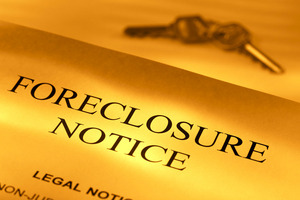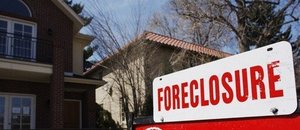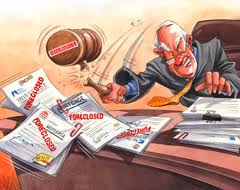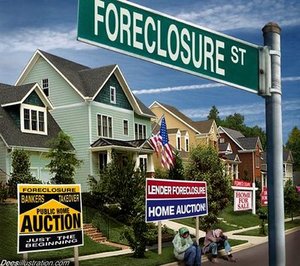 The foreclosure process is about to speed up for all Florida homeowners. Gov. Scott signed a bill that is intended to streamline the foreclosure process and give community associations more power in the process.
The foreclosure process is about to speed up for all Florida homeowners. Gov. Scott signed a bill that is intended to streamline the foreclosure process and give community associations more power in the process.
The bill requires banks to file cases with a clear chain of ownership of the mortgage note and how the delinquency occurred. If the case has the correct documentation, the lender can seek a “show cause” order as to why it shouldn’t be awarded a judgment and take the house. The homeowner would have to quickly raise a valid defense.
The bill also shortens the time period in which banks may assert a deficiency judgment against homeowners from five years down to one year. This strict cut off is due in part to Florida having one of the longest foreclosure processes taking an average of 900 days.
The bill also prevents homeowners who wrongly lost homes to foreclosure from getting them back. Instead, they would be awarded monetary compensation.
Here are some of the bill’s highlights:
Deficiency Judgments
Under current law, a lender has 5 years from the foreclosure sale to file a deficiency action. This bill amends current law to provide a one-year statute of limitations for an action to enforce a claim of a deficiency related to a note secured by a mortgage against residential property that is a one-family to four-family dwelling unit. The limitations period begins on the 11th day after a foreclosure sale or the day after the mortgagee accepts a deed in lieu of foreclosure.
This bill amends current law to limit a deficiency decree in the case of an owner-occupied home to the difference between the judgment amount, or in the case of a short sale, the outstanding debt, and the fair market value of the property on the date of sale. This appears to codify the current practice of the courts when rendering a deficiency judgment. The bill provides a rebuttable presumption that if a county property appraiser has granted a homestead exemption to a residential property, that property is owner-occupied.
The bill also eliminates the common law recovery of such a deficiency when the court in the foreclosure action grants or denies a claim for a deficiency judgment. This provision appears to simplify the language of the current law without providing a substantive change in the law.
Lost, Destroyed or Stolen Notes
The bill creates s. 702.015, F.S., to provide that every complaint in a foreclosure proceeding on residential real property designed principally for one to four families must contain affirmative allegations expressly made by the plaintiff that the plaintiff is the holder of the original note or must allege with specificity the factual basis by which the plaintiff is a person entitled to enforce the note. If the plaintiff is not the holder of the note, the complaint must describe the authority of the plaintiff and identify the document that grants the plaintiff the authority to file the complaint on behalf of the holder of the note.
The plaintiff must file either the original promissory note or certification that the plaintiff is in physical possession of the original note, unless it is lost, destroyed or stolen. If the plaintiff is in possession of the original note, he or she must file a certification with the court with the filing of the complaint, under penalty of perjury. If the plaintiff claims that the note is lost, destroyed or stolen, the complaint must contain an affidavit that details a clear chain of all assignments or endorsements of the promissory note, set forth facts showing the plaintiff is entitled to enforce the note, and include exhibits providing evidence of the acquisition, ownership and possession of the note. The bill requires adequate protection to the plaintiff under the Uniform Commercial Code (UCC).
Protections for Lost, Destroyed, or Stolen Notes in Mortgage Foreclosures
The bill establishes a reasonable means of providing adequate protection under the Florida statutory framework relating to the enforcement of a lost, destroyed or stolen instrument. As it relates to a mortgage foreclosure, adequate protection would include:
• A written indemnification agreement by a person reasonably believed to be sufficiently solvent to honor such an obligation;
• A surety bond;
• A letter of credit issued by a financial institution;
• A deposit of cash collateral with the clerk of the court; or
• Such other security as the court may deem appropriate under the circumstances.
Any security given must be on terms and in amounts set by the court and must run through the
applicable statute of limitations for enforcement of the note. The security also must indemnify the maker of the note against any loss or damage that might occur by reason of a claim by another person to enforce the note. Recovery of damages and costs and attorney fees may be sought against the person.
 Florida’s foreclosure process is a major hurdle in a slowly improving housing market. Today Florida has the highest rate of mortgages that are behind by more than 90 days. The national average for mortgages which are behind more than 90 days is currently at 5.6 percent. However, Florida is at a whopping 13.3 percent, over twice the country’s average. Florida had 103,000 residences that were auctioned or taken back by lenders over the past year. That total means that the state accounts for 8.8 percent of the foreclosure inventory, while the next highest state is at 6 percent. Many believe that the reason for this extremely high average is the states lengthy foreclosure process.
Florida’s foreclosure process is a major hurdle in a slowly improving housing market. Today Florida has the highest rate of mortgages that are behind by more than 90 days. The national average for mortgages which are behind more than 90 days is currently at 5.6 percent. However, Florida is at a whopping 13.3 percent, over twice the country’s average. Florida had 103,000 residences that were auctioned or taken back by lenders over the past year. That total means that the state accounts for 8.8 percent of the foreclosure inventory, while the next highest state is at 6 percent. Many believe that the reason for this extremely high average is the states lengthy foreclosure process. 








